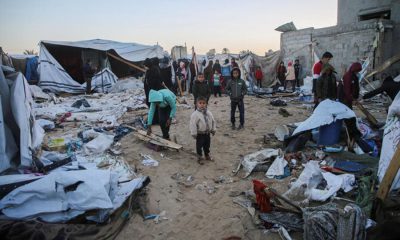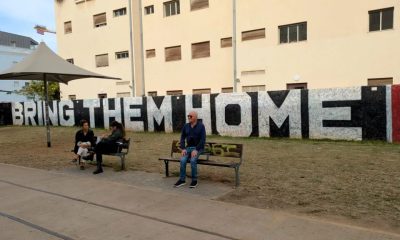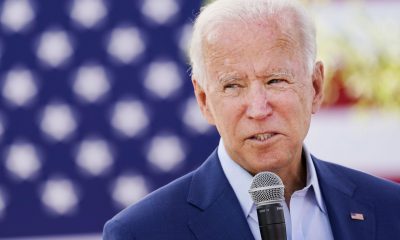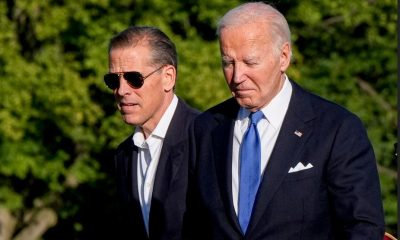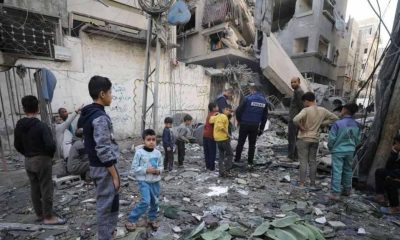International
US students slam Biden’s comments on Gaza encampments
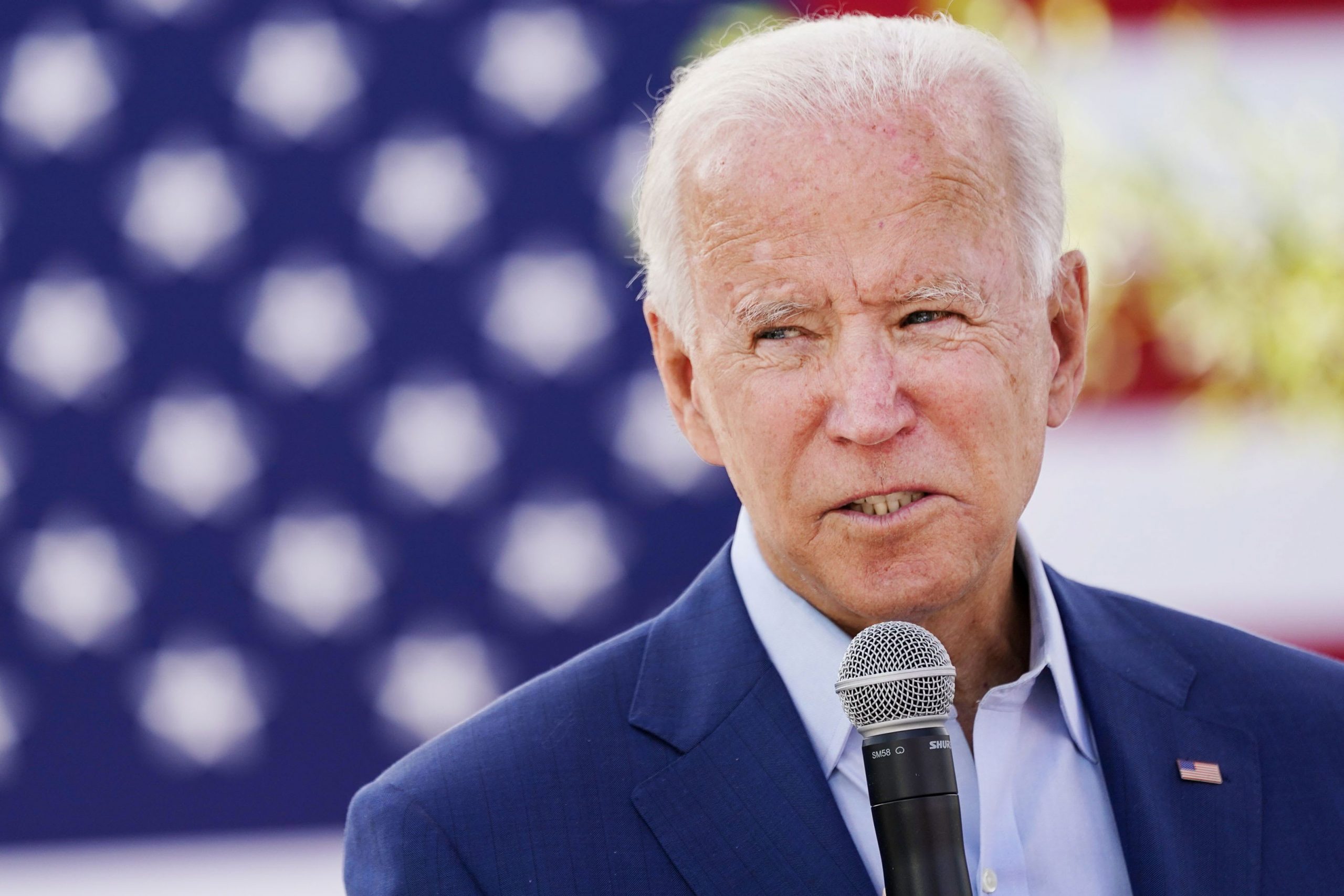
US students slam Biden’s comments on Gaza encampments
President Joe Biden says “order must prevail” on university campuses in the United States, just hours after police raided and dismantled another protest encampment in support of Palestinians.
In a brief news conference on Thursday, Biden said both the right to free speech and the rule of law “must be upheld” but stressed that “violent protest is not protected”.
“Vandalism, trespassing, breaking windows, shutting down campuses, forcing the cancellation of classes and graduation — none of this is a peaceful protest. Threatening people, intimidating people, instilling fear in people is not a peaceful protest,” he said.
“Dissent is essential to democracy, but dissent must never lead to disorder or to denying the rights of others so students can finish the semester and their college education,” Biden continued. “There’s a right to protest but not the right to cause chaos.”
Biden’s comments came shortly after police arrested at least 132 student protesters at the University of California, Los Angeles (UCLA), early on Thursday and cleared out an encampment.
UCLA is among the dozens of US universities where students have set up camps over the past few weeks to demand an end to Israel’s war in Gaza. Many are also calling for their schools to divest from any firms complicit in Israeli abuses.
READ ALSO:
- Gaza: Police arrest 2,000 pro-Palestine protesters on US campuses
- Three senior govt officials arrested over alleged illegal citizenship for foreigners
- N3bn fraud: Court adjourns trial of ex-Benue governor Suswam until May 8
The protests have been met with a fierce backlash from university administrators, as well as pro-Israel lawmakers and groups.
On Thursday, students and other observers quickly slammed Biden’s statement as failing to recognise that US colleges and universities have called heavily armed police forces onto their campuses to disperse non-violent demonstrations.
The recent arrests of students and faculty at UCLA and New York’s Columbia University, among other campuses, have drawn widespread condemnation.
But in his brief address, Biden did not comment on university policies or the use of force by police. Nor did he remark on reports that pro-Israel demonstrators had attacked pro-Palestinian demonstrators at the UCLA encampment this week.
Instead, he said there is no place on college campuses for “anti-Semitism or threats of violence against Jewish students”. Student demonstrators, however, have rejected accusations that their encampments are anti-Semitic or pose a threat.
“There’s a [sense of] disappointment, but there’s no surprise,” Kali, a student protester at George Washington University in Washington, DC, said of Biden’s remarks.
“For the Biden administration to demonise us in this way is honestly incredibly disappointing,” Kali told Al Jazeera. “It paints a target on the backs of Arab, Muslim, Palestinian, anti-Zionist youth.”
Political blowback
Biden has faced months of widespread anger and mass protests over his unwavering support for Israel during the Gaza war.
More than 34,500 Palestinians have been killed in Israeli attacks since early October. The besieged enclave faces a dire humanitarian crisis, and the top United Nations court said the war has spurred a plausible risk of genocide.
The US president, who is seeking re-election in November, also faces growing disapproval among young voters.
Biden’s approval rating stands at 28 percent among voters under age 30, according to a Pew Research Center survey released last week.
READ ALSO:
- Group protests alleged imposition of Imam in Osun
- FG paid $500m to terminate Ajaokuta Steel contract – Minister
- Rivers: Wike, Magnus Abe settle long-standing rift
A recent CNN poll also showed that a staggering 81 percent of voters younger than 35 disapprove of Biden’s handling of Israel’s war on Gaza.
The Democratic president’s support for Israel, condemnation of the student protests, and silence on the mass arrests and violence against demonstrators may fuel young people’s apathy — if not antipathy — towards him, experts said.
“The Democrats can’t really afford to give people more reasons to vote against Biden, and this actually becomes one,” Omar Wasow, assistant professor of political science at the University of California, Berkeley, told Al Jazeera.
‘Losing an entire generation’
Experts say young voters could be key to Biden’s prospects in November, as he faces a likely rematch against his 2020 rival, Republican Donald Trump.
In a close race, as the November election is expected to be, low turnout could spell trouble for the Democratic incumbent.
Hasan Pyarali — the Muslim Caucus chairperson for College Democrats of America, the university arm of the Democratic Party — told Al Jazeera he was disappointed by Biden’s comments on Thursday.
“In our point of view, it’s not just good policy to oppose the genocide; it’s good politics. He has done neither, and we’re really disappointed to see that,” said Pyarali, a senior at Wake Forest University in North Carolina.
He added that it was especially disheartening to hear Biden say he would not reconsider his Middle East policy as a result of the student protests.
“We’re here to make it known that if he doesn’t change course, there’s a real risk that we [Democrats] lose 2024,” Pyarali said.
He also said the prospect of Trump winning in November would not be enough to convince young voters to vote for Biden. “It’s not on us to make sure that Trump doesn’t come back; it’s on Biden and his campaign,” he said.
“It’s now on him to go forward. If he wants to continue down the path that is unpopular, unjust and genocidal, he certainly can — he’s the president of the United States. But it’s at the peril of essentially losing an entire generation of voters and also risking the 2024 election.”
US students slam Biden’s comments on Gaza encampments
Al Jazeera
International
Syria not threat to world, rebel leader al-Sharaa tells BBC
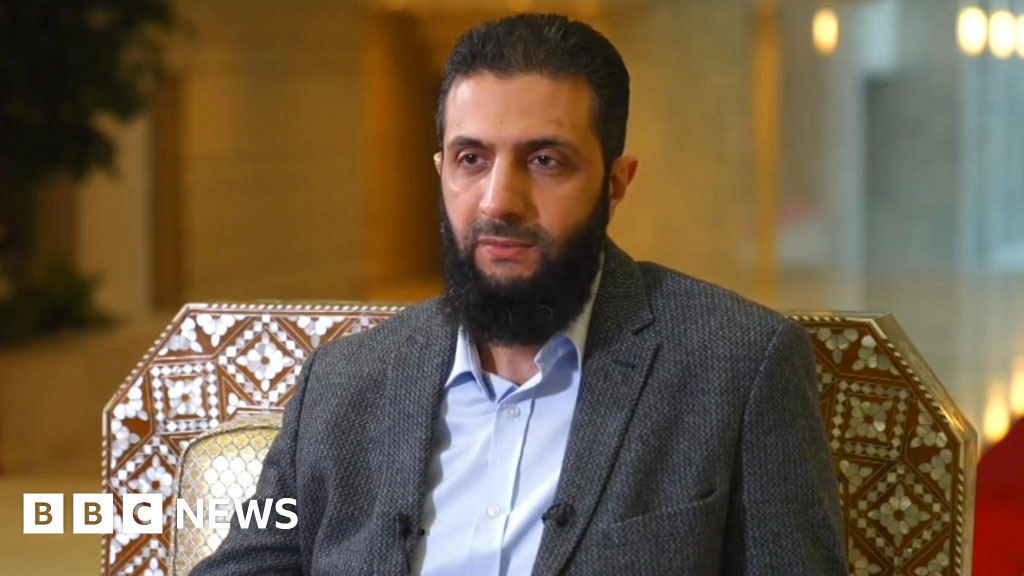
Syria not threat to world, rebel leader al-Sharaa tells BBC
The de facto leader of Syria, Ahmed al-Sharaa, has said the country is exhausted by war and is not a threat to its neighbours or to the West.
In an interview with the BBC in Damascus, he called for sanctions on Syria to be lifted.
“Now, after all that has happened, sanctions must be lifted because they were targeted at the old regime. The victim and the oppressor should not be treated in the same way,” he said.
Sharaa led the lightning offensive that toppled Bashar al-Assad’s regime less than two weeks ago. He is the leader of the Hayat Tahrir al-Sham (HTS), the dominant group in the rebel alliance, and was previously known by his nom de guerre of Abu Mohammed al-Jolani.
He said HTS should be de-listed as a terrorist organisation. It is designated as one by the UN, US, EU and UK, among many others, as it started as a splinter group of al-Qaeda, which it broke away from in 2016.
Sharaa said HTS was not a terrorist group.
They did not target civilians or civilian areas, he said. In fact, they considered themselves to be victim of the crimes of the Assad regime.
He denied that he wanted to turn Syria into a version of Afghanistan.
READ ALSO:
- Tinubu’s 2025 budget will increase poverty, worsen economy – PDP
- Real Madrid outclass Pachuca to win FIFA Intercontinental Cup
- Israel hits ports, energy sites in Yemen after missile intercepted
Sharaa said the countries were very different, with different traditions. Afghanistan was a tribal society. In Syria, he said, there was a different mindset.
He said he believed in education for women.
“We’ve had universities in Idlib for more than eight years,” Sharaa said, referring to Syria’s north-western province that has been held by rebels since 2011.
“I think the percentage of women in universities is more than 60%.”
And when asked whether the consumption of alcohol would be allowed, Sharaa said: “There are many things I just don’t have the right to talk about because they are legal issues.”
He added that there would be a “Syrian committee of legal experts to write a constitution. They will decide. And any ruler or president will have to follow the law”.
Sharaa was relaxed throughout the interview, wearing civilian clothes, and tried to offer reassurance to all those who believe his group has not broken with its extremist past.
Many Syrians do not believe him.
The actions of Syria’s new rulers in the next few months will indicate the kind of country they want Syria to be – and the way they want to rule it.
Syria not threat to world, rebel leader al-Sharaa tells BBC
BBC
International
Israel hits ports, energy sites in Yemen after missile intercepted
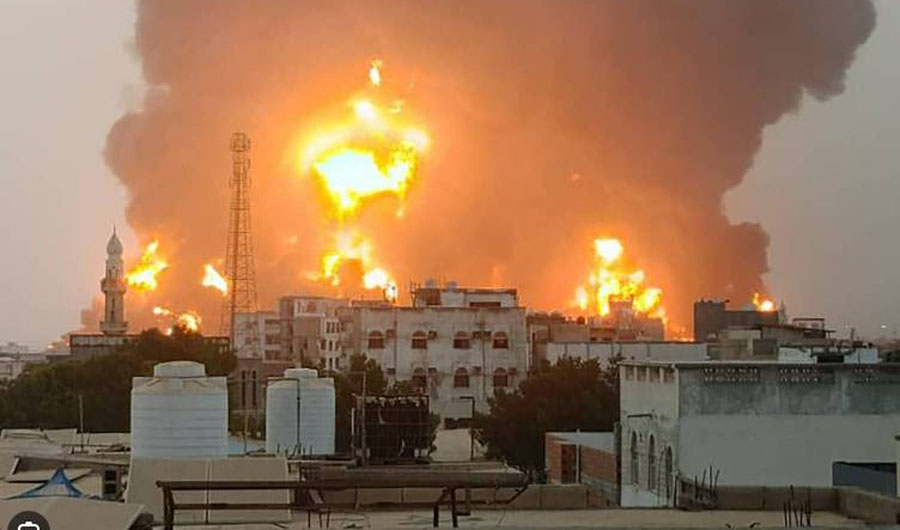
Israel hits ports, energy sites in Yemen after missile intercepted
JERUSALEM: Israel said Thursday it struck ports and energy infrastructure it alleges are used by Houthi militants, after intercepting a missile fired by the group.
Israel’s military said it “conducted precise strikes on Houthi military targets in Yemen — including ports and energy infrastructure in Sanaa, which the Houthis have been using in ways that effectively contributed to their military actions.”
The announcement came shortly after Israel said it had intercepted a missile fired from Yemen.
Al-Masira, a media channel belonging to the Houthis, said a series of “aggressive raids” were launched in the Yemeni capital of Sanaa and the port city of Hodeidah.
It reported raids that “targeted two central power plants” in Yemen’s capital Sanaa, while in Hodeidah it said “the enemy launched four aggressive raids targeting the port… and two raids targeting” an oil facility.
The strikes were the second time this week that Israel’s military has intercepted a missile from Yemen.
On Monday, the Houthis claimed a missile launch they said was aimed at “a military target of the Israeli enemy in the occupied area of Yaffa” — a reference to Israel’s Tel Aviv area.
READ ALSO:
- Gaza mediators intensify ceasefire efforts, Israeli strikes kill 20 people
- PDP expels South-East national vice chairperson over anti-party activities
- Your information on $1bn investment misleading, Dangote Refinery replies NNPCL
Also Monday, an Israeli navy missile boat intercepted a drone in the Mediterranean after it was launched from Yemen, the military said.
The Houthi militants have said they are acting in solidarity with Palestinians and pledged Monday to continue operations “until the aggression on Gaza stops and the siege is lifted.”
On December 9, a drone claimed by Houthis exploded on the top floor of a residential building in the central Israel city of Yavne, causing no casualties.
In July, a Houthi drone attack in Tel Aviv killed an Israeli civilian, prompting retaliatory strikes on the Yemeni port of Hodeidah.
The Houthis have also regularly targeted shipping in the Red Sea and the Gulf of Aden, leading to retaliatory strikes on Houthi targets by United States and sometimes British forces.
Israeli military spokesman Daniel Hagari said the group had become a “global threat,” pointing to Iran’s support for the militants.
“We will continue to act against anyone, anyone in the Middle East, that threatens the state of Israel,” he said.
Israel hits ports, energy sites in Yemen after missile intercepted
International
Gaza mediators intensify ceasefire efforts, Israeli strikes kill 20 people
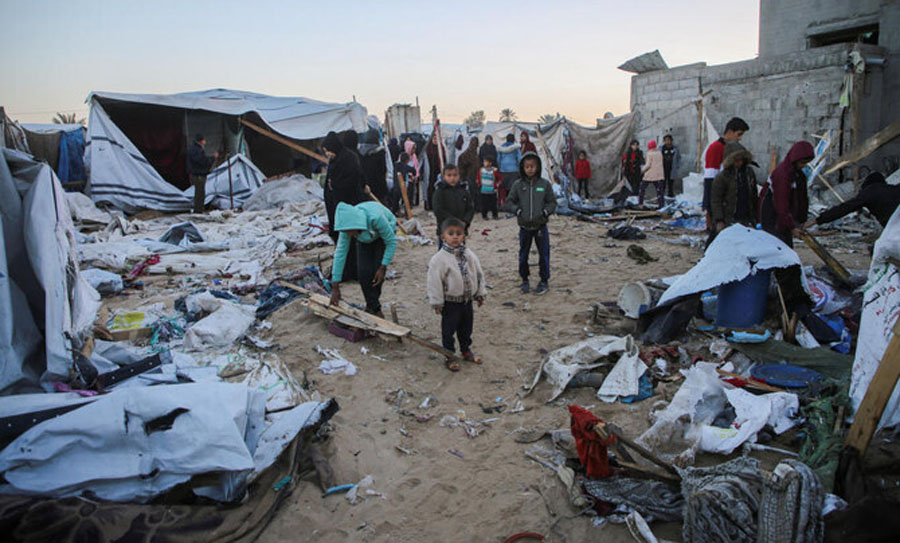
Gaza mediators intensify ceasefire efforts, Israeli strikes kill 20 people
CAIRO: The United States, joined by Arab mediators, sought on Wednesday to conclude an agreement between Israel and Hamas to halt the 14-month-old war in the Gaza Strip where medics said Israeli strikes killed at least 20 Palestinians overnight.
A Palestinian official close to the negotiations said on Wednesday that mediators had narrowed gaps on most of the agreement’s clauses. He said Israel had introduced conditions which Hamas rejected but would not elaborate.
On Tuesday, sources close to the talks in Cairo, the Egyptian capital, said an agreement could be signed in coming days on a ceasefire and a release of hostages held in Gaza in return for Palestinian prisoners held by Israel.
Medics said an Israeli airstrike killed at least 10 people in a house in the northern town of Beit Lahiya while six were killed in separate airstrikes in Gaza City, Nuseirat camp in central areas, and Rafah near the border with Egypt.
In Beit Hanoun in the northern Gaza Strip, medics said four people were killed in an airstrike on a house. There was no immediate comment from the Israeli military spokesman.
Israeli forces have operated in the towns of Beit Hanoun and Beit Lahiya as well as the nearby Jabalia camp since October, in a campaign the military said aimed to prevent Hamas militants from regrouping.
Palestinians accuse Israel of carrying out acts of “ethnic cleansing” to depopulate the northern edge of the enclave to create a buffer zone. Israel denies it.
READ ALSO:
- PDP expels South-East national vice chairperson over anti-party activities
- Your information on $1bn investment misleading, Dangote Refinery replies NNPCL
- Many die at Ibadan children’s Christmas party stampede, organisers arrested
Hamas does not disclose its casualties, and the Palestinian health ministry does not distinguish in its daily death toll between combatants and non-combatants.
On Wednesday, the Israeli military said it struck a number of Hamas militants planning an imminent attack against Israeli forces operating in Jabalia.
Later on Wednesday, Muhammad Saleh, director of Al-Awda Hospital in Jabalia, said Israeli shelling in the vicinity damaged the facility, wounding seven medics and one patient inside the hospital.
The Israeli military had no immediate comment.
In the Central Gaza camp of Bureij, Palestinian families began leaving some districts after the army posted new evacuation orders on X and in written and audio messages to mobile phones of some of the population there, citing new firing of rockets by Palestinian militants from the area.
CEASEFIRE GAINS MOMENTUM
The US administration, joined by mediators from Egypt and Qatar, has made intensive efforts in recent days to advance the talks before President Joe Biden leaves office next month.
In Jerusalem, Israeli President Isaac Herzog met Adam Boehler, US President-elect Donald Trump’s designated envoy for hostage affairs. Trump has threatened that “all hell is going to break out” if Hamas does not release its hostages by Jan. 20, the day Trump returns to the White House.
CIA Director William Burns was due in Doha on Wednesday for talks with Qatari Prime Minister Sheikh Mohammed bin Abdulrahman Al-Thani on bridging remaining gaps between Israel and Hamas, other knowledgeable sources said. The CIA declined to comment.
Israeli negotiators were in Doha on Monday looking to bridge gaps between Israel and Hamas on a deal Biden outlined in May.
There have been repeated rounds of talks over the past year, all of which have failed, with Israel insisting on retaining a military presence in Gaza and Hamas refusing to release hostages until the troops pulled out.
The war in Gaza, triggered by a Hamas-led attack on communities in southern Israel that killed some 1,200 people and saw more than 250 abducted as hostages, has sent shockwaves across the Middle East and left Israel isolated internationally.
Israel’s campaign has killed more than 45,000 Palestinians, displaced most of the 2.3 million population and reduced much of the coastal enclave to ruins.
Gaza mediators intensify ceasefire efforts, Israeli strikes kill 20 people
ARAB NEWS
-

 Railway14 hours ago
Railway14 hours agoLagos Rail Mass Transit part of FG free train ride – NRC
-

 metro2 days ago
metro2 days agoCourt stops customs from seizing imported rice in open market
-

 metro3 days ago
metro3 days agoFG transfers electricity market regulatory oversight in Lagos to LASERC
-

 metro2 days ago
metro2 days agoIbadan stampede: Tinubu orders probe as death toll hits 40
-

 metro2 days ago
metro2 days agoAfe Babalola: Court grants Dele Farotimi bail, barred from media interviews
-

 News2 days ago
News2 days agoAdebayo Ogunlesi, 2 other Nigerians make Forbes 50 wealthiest Black Americans list 2024
-

 metro15 hours ago
metro15 hours agoNIMC warns against extortion, reaffirms free NIN enrollment
-

 metro1 day ago
metro1 day agoIbadan stampede: Ooni reacts after arrest of ex-wife

